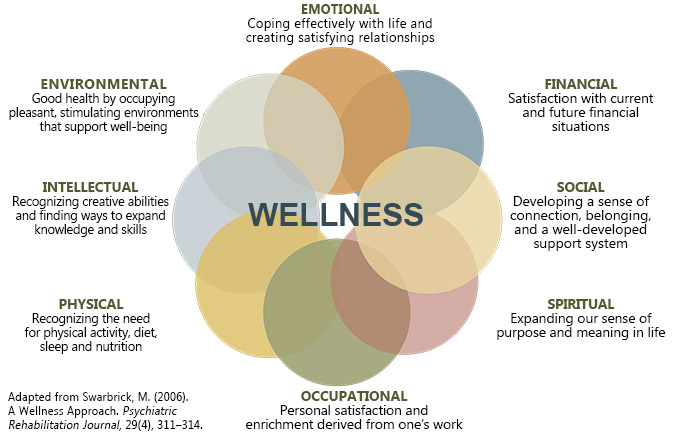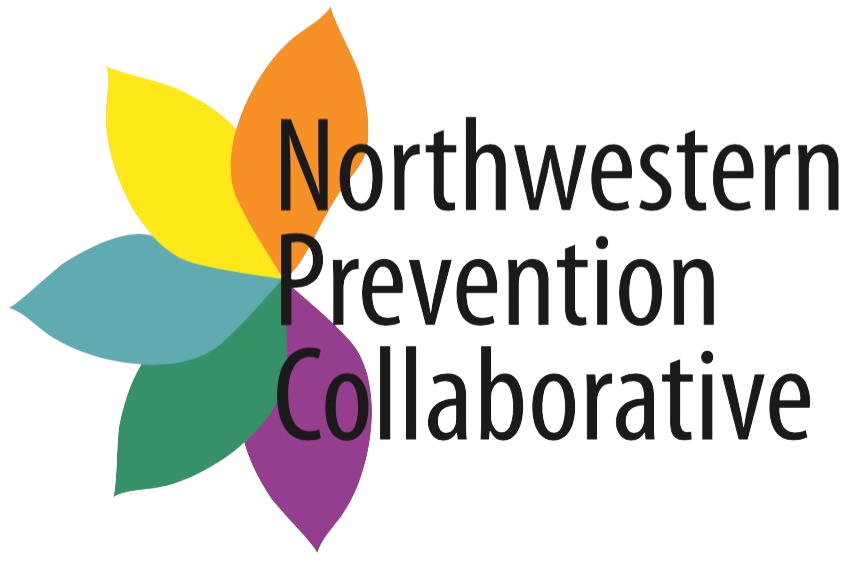The term “wellness” often invokes thoughts of health and physical wellbeing, including things such as exercise, nutrition, weight, and being well rather than ill. But wellness is about more than that. It includes your overall wellbeing, including your mental and spiritual wellness. It is about how your body feels, how clear your mind is, your emotions–it is a complex concept that encompasses every facet of your life.
The Substance Abuse and Mental Health Services Administration (SAMHSA) offers a guideline of eight areas, or dimensions, of wellness. As you can see in the SAMHSA diagram below, each dimension contributes to our own sense of wellness or quality of life. In addition, each dimension affects and overlaps the others. Most likely, you will focus on one particular area more than the others at any given time, as it is difficult to be balanced in all areas at all times. The important thing is to not neglect any one aspect, as doing so for any length of time can have adverse effects on your overall health.

The Eight Dimensions of Wellness
- Physical
- Emotional
- Intellectual
- Social
- Spiritual
- Financial
- Environmental
- Occupational
Physical Dimension
Physical wellness encompasses healthy behaviors that impact your body, including adequate exercise, getting enough rest, and proper nutrition. It also includes abstaining from harmful habits such as drug use and alcohol misuse. It means learning about and identifying symptoms of disease, getting regular medical checkups, and protecting yourself from injuries and harm. Developing such healthy habits today can enhance the quality of your life and help you live longer.
Tips for optimal physical wellness:
- Exercise daily.
- Get adequate rest.
- Use seat belts, helmets, and other protective equipment.
- Learn to recognize early signs of illness.
- Eat a variety of healthy foods.
- Control your meal portions.
- Avoid vaping, smoking (protect yourself against second-hand smoke), and marijuana.
- Use alcohol in moderation, if at all.
Emotional Dimension
Being emotionally well is typically defined as possessing the ability to feel and express human emotions such as happiness, sadness and anger. It means having the ability to love and be loved and achieving a sense of fulfillment in life. Emotional wellness encompasses optimism, self-esteem, self-acceptance and the ability to share feelings.
Tips for optimal emotional wellness:
- Tune-in to your thoughts and feelings.
- Cultivate an optimistic attitude.
- Express gratitude.
- Seek and provide support.
- Learn time management skills.
- Practice stress management techniques.
- Accept and forgive yourself.
Intellectual Dimension
The intellectual dimension encourages creative, stimulating mental activities. Your mind needs to be continually inspired and exercised just as your body does. There is truth in the idea that being a lifelong learner keeps the mind young! An intellectually well person uses the resources available to expand one’s knowledge, learn new skills, or improve current skills. Keeping up to date on current events and participating in activities that arouse your mind are also important.
Tips and suggestions for optimal intellectual wellness include:
- Take a course or workshop.
- Learn (or perfect) a foreign language.
- Seek out people who challenge you intellectually.
- Read.
- Learn to appreciate art.
- Cultivate a new hobby.
Social Dimension
Social wellness refers to your ability to connect with others and develop your circles of family, close friends, friends, acquaintances, and community. It includes showing respect and empathy for others and yourself. Contributing to your community and to the world builds a sense of belonging.
Tips and suggestions for optimal social wellness include:
- Cultivate healthy relationships.
- Get involved.
- Contribute to your community.
- Share your talents and skills.
- Communicate your thoughts, feelings and ideas.
Spiritual Dimension
Spiritual wellness involves possessing a set of guiding beliefs, principles, or values that help give direction to one’s life. It encompasses a high level of faith, hope and commitment to your individual beliefs that provide a sense of meaning and purpose. It is willingness to seek meaning and purpose in human existence, to question everything and to appreciate the things which cannot be readily explained or understood. A spiritually well person seeks harmony between what lies within as well as the forces outside.
Tips and suggestions for optimal spiritual wellness:
- Explore your spiritual core.
- Spend time alone/meditate regularly.
- Be inquisitive and curious.
- Be fully present in everything you do.
- Listen with your heart and live by your principles.
- Allow yourself and those around you the freedom to be who they are.
- See opportunities for growth in the challenges life brings you.
Environmental Wellness
Environmental wellness consists of surrounding yourself with a space that brings you peace. Ideally, it maximizes harmony with the earth and minimizes harm to the environment. It may include being involved in socially responsible activities to protect the environment, but can be as simple as caring for the places in which you live and work to the best of your ability.
Tips and suggestions for optimal environmental wellness:
- Conserve water and other resources.
- Minimize chemical use.
- Reduce, Reuse, Recycle.
- Renew your relationship with the earth.
- Maintain an organized work environment.
- Maintain a clean home.
- Play music you love when appropriate.
- Add plants to your space.
- Take a walk and appreciate the environment.
Financial Dimension
Financial wellness is a feeling of satisfaction about your financial situation. This does not mean that you have all the money and things you want, but you learn to manage what you have and be content with it. Finances are a common stressor for people, so being able to minimize worry about this aspect of your life can enhance your overall wellness.
Tips and suggestions for financial wellness:
- Have a household budget.
- Start a savings account and add to it every month even, if it is just a small amount.
- Save some of your income in an emergency account.
- Limit unnecessary expenses.
- Avoid accumulating credit card debt.
- Donate to a charity that holds meaning for you.
- Shop at thrift stores.
- Visit the library for free books and DVDs.
- Cook your own meals instead of dining out.
Try tracking your spending for a month to see where your money is going and set goals based on what you find.
Occupational Dimension
Occupational wellness involves preparing and making use of your gifts, skills, and talents in a way that is meaningful to you. It also includes a balance–all work and no play truly is not good for you! Occupational wellness means successfully integrating a commitment to your occupation into a total lifestyle that is satisfying and rewarding. Achieving optimal occupational wellness avoids burnout and allows you to maintain a positive attitude and experience satisfaction/pleasure in your employment.
Tips and suggestions for optimal occupational wellness include:
- Explore a variety of career options.
- Create a vision for your future.
- Choose a career that suits your personality, interests and talents.
- Be open to change and learn new skills.
For more information about wellness, check out our podcast, Positive Vibes from the Valley.




Comments are closed.